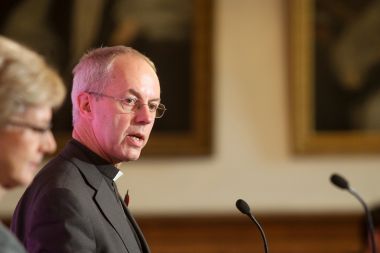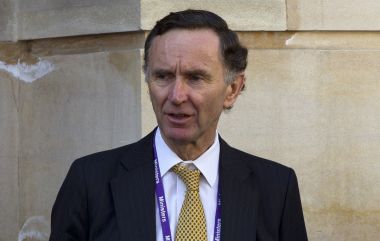Can business training solve CofE's 'toxic' leadership problem?

Senior clergy in the Church of England are being summonsed to sign up for MBA-style leadership courses as the Archbishops of Canterbury and York attempt to create a Church fit for the 21st century.
Plans for the business-style leadership programme to bring about Church growth and create a "talent" pool of future bishops and archbishops have already been condemned by clergy who have warned of "demoralisation" and "alienation".
The plans, outlined in a new report leaked online, will cost the Church £2million up to the end of 2016 and a further £785,000 a year from 2017.
The report, 'Talent Management for Future Leaders and Leadership Development for Bishops and Deans: A New Approach', has emerged from steering group chaired by Lord Green, former conservative trade minister and former group chairman of HSBC.
It heralds a "culture change" in the way the Church chooses and trains its bishops and other leaders.
It says mere "values" are not enough in a culture that often speaks of values derived from Christian roots. And while the "brand" of the Church of England is still deeply embedded, there are economic and cultural threats and the influence of bishops in general and in Parliament is waning, it warns.
The cost of taking a stand on some subjects and the failure to take a sufficient stand on others has led to young people seeing the leadership of the Church, if not the Church itself, as toxic, the report adds. This means not enough young women or people from black, Asian and ethnic minorities are being attracted to ministry.
The report is defined by the style of the Archbishop of Canterbury Justin Welby, who in an address to General Synod last year said that custodians of a gospel that transforms society are "called by God to respond radically and imaginatively to new contexts." It has been signed off by Archbishop Welby and the Archbishop of York, Dr John Sentamu.
The two Archbishops are charged in the report with explaining to the wider Church why it is needed. The steering group included three bishops, James Langstaff, Nigel Stock and Tim Thornton.

Drawn up with advice from Christopher McLaverty, former head of talent at BP, it recommends a "new and dynamic curriculum" to support the leadership development needs of current bishops and deans. It also recommends "radical change" in the way future church leaders are identified and developed. Deans, who run cathedrals that can have multi-million pound turnovers, will be sent on mini-MBAs. The programmes will not be run by theological colleges but top flight business educational institutions.
The report describes the need for a "profoundly prayerful cadre of bishops and deans" who are confident leaders and evangelists, working for the sake of the Church and the nation.
It translates the language of family therapy into a business strategy for the Church. "The goal is more ministry, not more bureaucracy," it says. "Organisations which have come late to the rigorous management of risk can easily read across from management to aversion. A fairly recent insight into leadership from family therapy is the capacity of good leaders to serve an emerging agenda for growth and development by creating spaces of safe uncertainty in which creative and emotionally intelligent change can happen. We are advocating the embrace of credible risk as an integral part of our adventure in Christ."
It speaks of a "radical step change" and of creating spaces of "safe uncertainty".
The goals are not limited to bishops and deans but will be rolled out also to leaders of mission agencies, superiors of religious communities, team rectors and the leaders of large parish churches. The aim is to develop clergy of "exceptional leadership potential" to impact on every area of the Church's mission and to be more open to talent spotting clergy from a wider variety of backgrounds.
"The Church must be more intentional about drawing in those with high potential who do not appear to 'fit in'," the report says. It must be more "adventurous".
The first leadership programme will involve diocesan bishops. Suffragan bishops and deans will be next. The report also says that bishops "need to build appropriate ambition and flexibility into the leadership capacity of their senior teams, including the bishop's staff team and the bishop's council."
Bishops will be trained in fundraising and sent on evangelism field visits to learn how to achieve growth. They will be taught coaching and mentoring skills, finance and budgets and how to run a heritage site.
Case studies from the National Trust, BBC, NHS Health Trusts and the Armed Services will be used to teach best practice.
One important first step will be to consider the names of programmes and projects. Currently, corporate labels such as "talent management", "leadership development programme", "talent pool" and "alumni network" have been used, the report admits. "These should perhaps be replaced by terms meaningful to the Church."
One factor which will influence whether a person is chosen for the leadership programmes or the new talent pool will be the extent to which they are judged capable of "accelerated development". They might also be ruled out by "personal issues". They might for example be rejected if it is felt that "personal charisma" dominates rather than living out the gospel message. Personal issues might include "family issues" and time commitment.
The report has emerged as the Church of England has just made its biggest change in leadership in two millennia with the admission of women to the episcopate and with the first woman expected to be announced soon.
Sally Barnes, of Women and the Church, said: "While I have no objection to training people in their role or for their roles, indeed it is an important aspect of development, I do have concerns about who will do this and what the underpinning philosophy will be. It is perfectly possible to include more women and minority groups while at the same time moulding them to become part of the establishment to keep the spurious concept of unity at the expense of being catalysts for real change and developing the Gospel. This is something we have been suffering from for too long. What about those men and women who serve in really challenging urban and rural parishes who face issues others could not begin to imagine who will always have trouble putting more bums on seats but do amazing work? There are so many issues that need to be considered arising out of this report."
Bishop of Willesden Pete Broadbent said on the Thinking Anglicans site, which published the report in full: "People may have noticed that the church is full of priests and bishops who find conflict difficult, who aren't strategic, who find it hard to tell hard facts to people who aren't doing their priestly task, and whose understanding of the seriousness of the task facing the CofE is not there, because they're in denial. If we want to re-evangelise England and let God build his kingdom here, we need a bit of backbone and leadership as well as being servants, shepherds and prophets. The old wet liberal ethos has no traction any more."
Professor Martyn Percy, Dean of Christ Church, Oxford said he had already received a summons, urging early booking on the new MBA-style programme for senior church leaders. He warned of "demoralisation" and "alienation".
Writing in the Church Times, he said: "There are serious problems with this report, however - not only within the text, but also the manner in which it was conceived," he continues. "On offer is a dish of basic contemporary approaches to executive management, with a little theological garnish. A total absence of ecclesiology flows from this."
The report says an individual's potential will be measured against "growth factors".
Percy commented: "The report highlights "high", "outstanding", and "strong performance" as key indicators of leaders: "No prophets or pastors, then; and a final fond farewell to those tiresome theologians."
He added: "We appear to live in an age in which all bishops must now fit the "executive mission-minded-middle-manager" paradigm. Our executive managers who run the Church tell us that this is what is needed. Before ordination, Justin Welby was himself both a product and proponent of this executive-management culture. But, as an Archbishop, he should exercise far more caution when giving sweeping powers to unrepresentative task forces such as this."
A spokesman for the Church of England said: "Lord Green's report was presented to the Archbishops in the summer, discussed at the College of Bishops and further considered at regional bishops' meetings this autumn. The House of Bishops met earlier this week and welcomed the implementation plan prepared in the light of those discussions. Details will be published next month."











